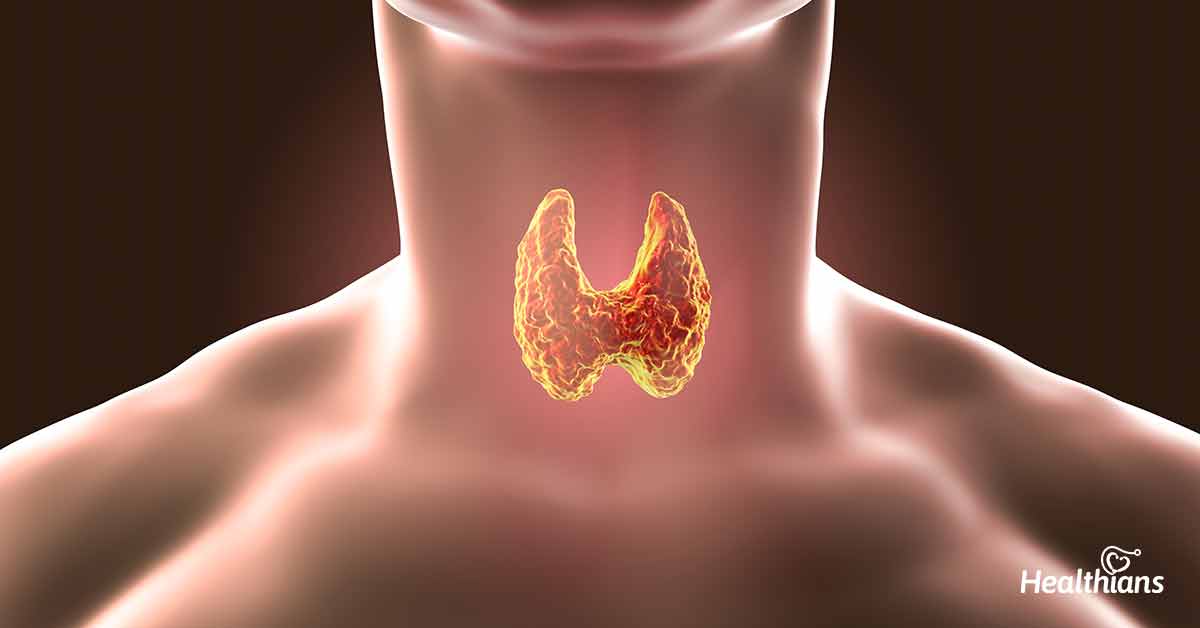Contributed by: Healthians Team
There are many myths and misconceptions that surround thyroid disease. Reasons and facts about this important gland are often sacrificed to opinion and myth. Demonstrable falsehoods are circulated and recycled as facts. Thyroid myths lead to greater stigma, misunderstanding, and most significantly misdiagnosis. Here’s what you need to know about the most common—and the strangest—myths about this metabolism-controlling gland and the truth behind each one.
Myth #1: A Swelling in Your Neck Indicates Thyroid Disease
Fact:
While the thyroid is the most common thing that can enlarge in your neck, not all swellings in the neck region signal an enlarged thyroid. It could equally be a swollen lymph node or an enlarged cyst. Consult a doctor. He will conduct a physical examination and advise some simple tests to shed light on the functioning of your thyroid gland and the cause of your swelling.
Myth #2: If you have a thyroid problem, you will have obvious symptoms
Fact:
Not necessarily. The thyroid is a multi-faceted symptomatic condition that takes a while to develop. Its symptoms may also seem subtle, making it tough for a diagnosis. About 60% of people with thyroid disease aren’t aware of it. Its vague symptoms are frequently overlooked and misdiagnosed in women, particularly because other female-specific, hormone-related illnesses, such as premenstrual dysphoric disorder, perimenopause, and menopause, may have comparable symptoms. Your best bet to keep track of your thyroid health and hormone levels is A TSH (thyroid-stimulating hormone) blood test. Talk to your healthcare professional to find out if you are suffering from hyperthyroidism (overactive thyroid) or hypothyroidism (underactive thyroid).
Myth #3: Only Women Get Hypothyroidism
Fact:
It’s true that thyroid disease, particularly hypothyroidism, affects more women than males. In fact, women over 60 years of age have the highest likelihood of developing an underactive thyroid. This is due to the fact that it is an autoimmune disease that is more prevalent in women due to the presence of estrogen. However, thyroid-related issues can affect both men and women as they age. Hair loss, constipation, exhaustion, a decrease of libido desire, and painful muscles are just a few of the signs and symptoms of underactive thyroid in males.
Myth #4: You Don’t Need Thyroid Medication to Control Your Thyroid
Fact:
If you have been diagnosed with thyroid disease, it cannot be addressed just by nutrition. Thanks to medical developments, several drugs are now available to effectively treat disorders affecting the thyroid gland. Consult your doctor to determine the best treatment option for you. A mix of medications, a good diet, and exercise is the best course of treatment.
Myth #5: Only Older People Get Thyroid Disease
Fact:
Thyroid problems are typically associated with persons of a specific age. But it isn’t an illness that affects only the elderly. It can affect people of all ages, although it is more common in women after childbirth or in their late 30s as their hormones shift. Even if you’re young and still experiencing thyroid symptoms (weight gain, fatigue, etc.), you should seek medical help.
Myth #6: Thyroid medications cannot be taken in pregnancy
Fact:
Not true. It’s perfectly safe to take thyroid hormone thyroxine during your pregnancy. In fact, it’s unsafe not to take thyroid medication during pregnancy as thyroid hormones play an important role as a regulator of fetal development. Without a closely monitored line of treatment, thyroid abnormalities can cause major concerns during pregnancy, such as miscarriage, premature delivery, and developmental difficulties in the fetus.
Myth #7: Thyroid disorders are easy to treat.
Fact:
Thyroid conditions are not easy to treat, but treatment isn’t that complicated either and requires a number of different approaches to successfully diagnose and manage the condition.
The bottom line
With an overwhelming abundance of information on the internet, it has become very difficult to figure out what’s true and what’s not. Don’t believe everything you hear about thyroid disease. If you’re concerned about some symptoms, talk to your doctor to get the help you need, whether it’s for thyroid disease or a different problem that you are experiencing.




